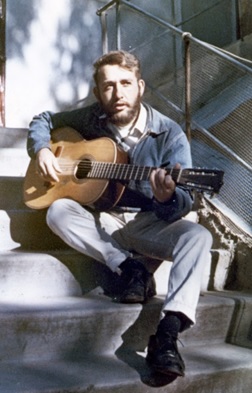Hochstedler, Eli (1942-1975)
Eli Hochstedler: activist and Paxman; born 29 December 1942 near Kokomo, Indiana to Milo Hochstedler and Mary [A. Miller] Hochstedler. He was the oldest of six children in a family of five sons and one daughter. In 1972 he married Ruth Reber. Eli died 20 April 1975 in New Hope, Pennsylvania.
Eli’s parents were Amish and became Mennonite when Eli was born. His family moved to Brown County when he was nine years old, where he received his education. His early education was completed at a small one-room school, which he attended up until seventh grade when he transferred to a 300-person school. Eli attended Nashville High School, and was very active in extracurriculars. These included editing the school newspaper, managing the yearbook, being the president of his school’s choir and Youth-for-Christ group, as well as participating in track and field and drama. He graduated from Nashville High School as valedictorian in the spring of 1961.
Eli attended Goshen College (Goshen, Indiana) from 1961 to 1965, studying chemistry and biology. During his junior year, he transferred to Tougaloo Southern Christian College in Mississippi as part of an exchange program between the two schools. At Tougaloo Eli gradually became more involved with the civil rights movement. In a brief autobiography, Eli stated that he “wanted to see the ‘closed society’ close at hand,” however his observation quickly led to his direct participation in the Civil Rights Movement after three peers at Tougaloo–Ida Hannah, Bettie Poole, and Julie Zaugg–were arrested at a pray-in. Eli also attended the pray-ins and was himself arrested on 16 April 1964 while trying to desegregate an event at the Jackson Municipal Auditorium. Eli was severely beaten by other inmates while in custody; he was released on bail after over four days.
Eli publically shared about his experiences during his senior year at Goshen College. In a later letter from 1968, Eli stated that he “was speaking or showing slides on the average of once every week” about his time in Mississippi. He considered joining either the Peace Corps or Pax Service as a conscientious objector, eventually deciding on Pax because proselytizing was not allowed in the Peace Corps.
Eli graduated from Goshen College in the spring of 1965. After graduation Eli attended Pax training at Mennonite Central Committee’s headquarters in Akron, Pennsylvania, before departing for service in Bolivia. While in Bolivia, Eli assisted multiple community organizations in Cuatro Ojitos, including the “Comisión de Salud” (Health Commission) and “Unión Cultural Para Acción Comunal” (Cultural Union for Community Action), which promoted healthcare and community improvement respectively. Additionally, Eli worked with David Nisley to assist with starting a local school and producing a weekly informational newspaper. Pax service workers in Bolivia also collaborated with local Methodist initiatives to learn about community development.
After serving in Bolivia for three years, Eli returned to the United States in 1967 and began studying rural sociology at Cornell University in 1968. Meanwhile Eli continued his activism in multiple ways. At the 1969 Mennonite Church (MC) General Conference in Oregon, Eli helped the conference come to recognize draft resistance as a valid form of protest to the Vietnam War. He also went on to help form an intentional living community named Llenroc. It was at this time that Eli developed relationships with Quakers and others at New Swarthmore. Through A Quaker Action Group, Eli became involved in the protests of the US Navy’s military activities on the island of Culebra, Puerto Rico. Eli helped build a chapel on a beach that was frequently bombed and worshiped there.
In 1972 Eli returned to Swarthmore, Pennsylvania and married Ruth Reber on 17 August 1972. In 1974 Eli briefly became involved in organizing farmers on the East coast. Eli passed away on 20 April 1975 in a canoeing accident in New Hope. Eli was posthumously described by the MCC Director of Latin America, Edgar Stoesz, as “probably a little more Quaker now than Mennonite. He is too Christ-like to be an orthodox Mennonite—a little too selfless—a little too unconcerned with material things—a little too generous with himself—.”
Eli devoted his life to the service of others; from his time spent connecting the Goshen and Tougaloo College students, to his work as a Paxman in Bolivia, to protesting the actions of the US military in Culebra, he was dedicated to trying to meet the needs of others in whatever way he could.
Bibliography
| Author(s) | Emily Strzelecki |
|---|---|
| Date Published | 19 Sep 2024 |
Cite This Article
MLA style
Strzelecki, Emily. "Hochstedler, Eli (1942-1975)." Global Anabaptist Mennonite Encyclopedia Online. 19 Sep 2024. Web. 26 Sep 2024. https://gameo.org/index.php?title=Hochstedler,_Eli_(1942-1975)&oldid=179695.
APA style
Strzelecki, Emily. (19 Sep 2024). Hochstedler, Eli (1942-1975). Global Anabaptist Mennonite Encyclopedia Online. Retrieved 26 September 2024, from https://gameo.org/index.php?title=Hochstedler,_Eli_(1942-1975)&oldid=179695.
©1996-2024 by the Global Anabaptist Mennonite Encyclopedia Online. All rights reserved.
